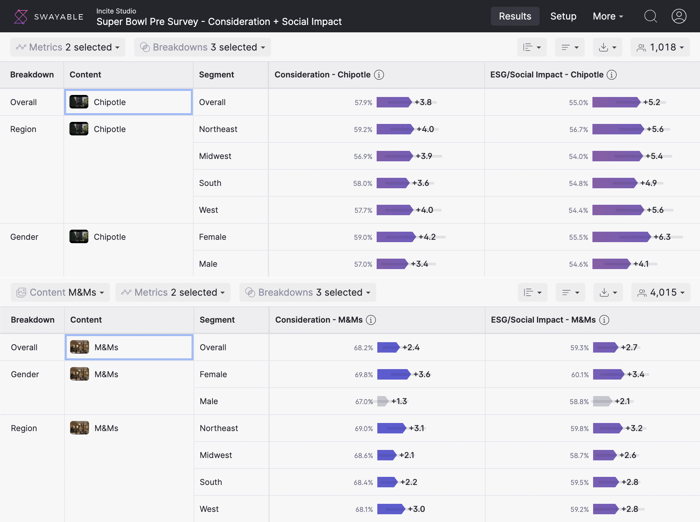Do Commercial Ads That Center on Social Impact Work?
Earlier this year, Swayable partnered with client Incite Studio to test 30 of the top 2021 Super Bowl Ads to answer a big question facing the advertising industry: do social impact focused ads work? That is, do they lift brand perceptions and consideration for the advertiser’s products? And do they have any impact on social issues?
The Super Bowl is America’s biggest television event, drawing audiences of over 100 million people. As a result, the ad breaks are now as much of a spectacle as the event itself. Like the rest of the community, advertisers this year faced unprecedented challenges due to the pandemic and concurrent national social and political crises. Many chose to tackle these hardships and societal challenges head-on, telling stories with broader purpose.
The Mars brand M&Ms has historically pushed on humor in their Super Bowl ads, bringing their colorful chocolates to life with animation and distinctive characters. Staying true to this trend, they premiered an ad with a comedic spoof on the phrase, “I’m sorry”. In contrast, Chipotle, the Mexican fast food titan, surprised viewers with the seriousness of their environmental sustainability focused ad with messaging on changing the world by promoting locally grown, organic, and sustainable ingredients. Which worked better?
Measuring ad impact on consumer brand consideration
Incite and the Swayable Advanced Services team used the Swayable platform to conduct a series of randomized controlled trial digital survey experiments. Responses were collected from over 25,000 U.S. adult consumers, split into test and control groups, in order to make a direct scientific measurement of the impact each ads caused, and to shed light on why. Each ad was scored across two main metrics: (1) brand consideration, and (2) brand ESG perceptions. The platform also analyzed changes in social and institutional trust, underlying attitudes that support and enable social progress.
Results showed that the sustainability-focused Chipotle ad was very successful at increasing brand consideration, moving it +3.8 percentage points, while also moving brand ESG perception by +5.2. It did this while also making measurable positive change on social trust. The ad for M&Ms was also successful at increasing brand consideration (+2.4 points overall), but in contrast, it did not cause any change in respondents’ degree of social and institutional trust, and had half the impact on brand ESG perceptions for M&Ms.

The Incite and Swayable teams systematically analyzed these metrics across all 30 ads and discovered a remarkably similar story: ads that caused the greatest impact on brand ESG perceptions were much more likely to also be the ones that drove highest brand consideration (chart below). These results validate the decisions made by the brands that chose to center social impact in their Superbowl storytelling. Consumers appear to appreciate and reward companies they recognize for addressing hard problems they care about, and doing the right thing.
That last “doing” part is key. It may be great to talk the talk, but as some have found out the hard way, that can be risky unless you’re also walking the walk.
Interested in running your own RCT test to measure the impact of your ads?
